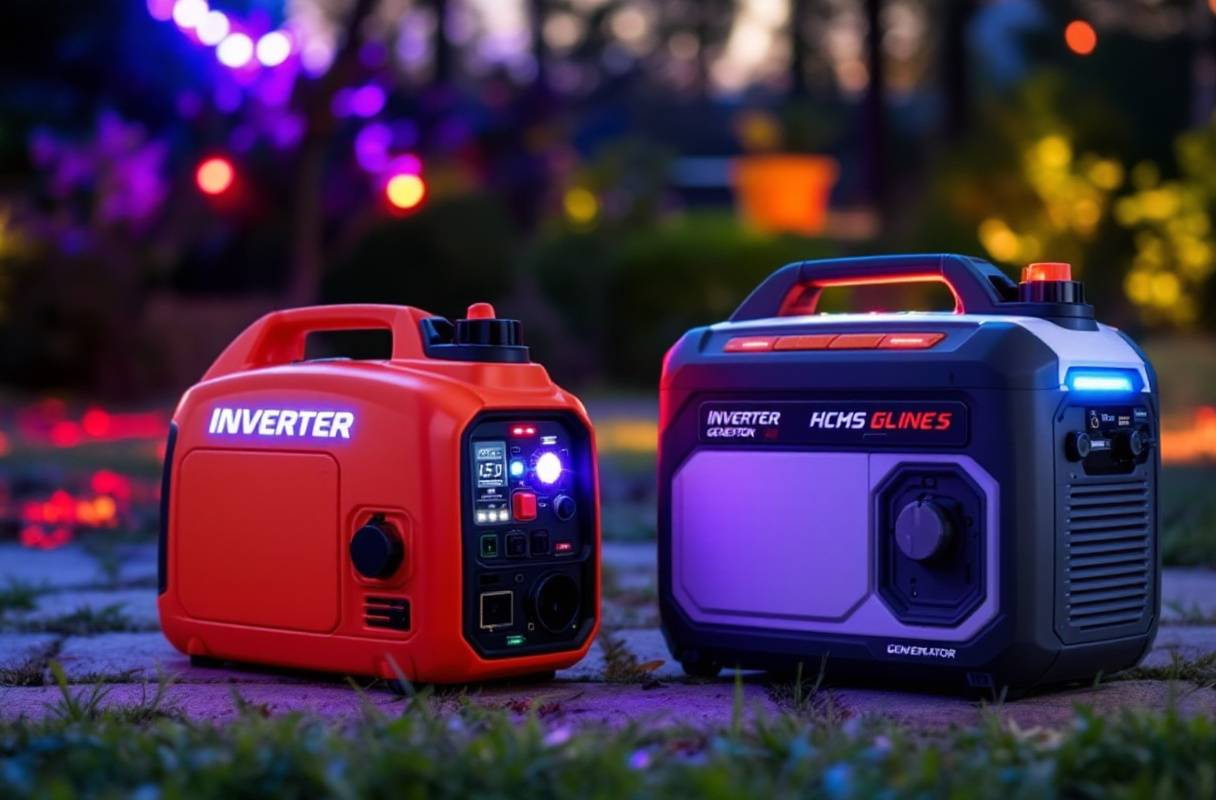Imagine facing a blackout during a crucial moment or setting up camp without reliable power—scenarios where portable generators become your unsung heroes.
But with options like inverter and conventional generators, how do you choose the perfect match for your needs?
Dive into our comprehensive guide where we unravel the key differences, benefits, and ideal use cases of each type, ensuring you make an informed decision that aligns seamlessly with both your lifestyle and energy requirements.
Understanding Portable Generators
Portable generators are like the Swiss Army knives of the power world—super handy and reliable for all kinds of situations. Whether you’re keeping the lights on during a blackout or need some juice at your off-the-grid cabin, these bad boys are pretty much a must-have.
Why Portable Generators Rock
Portable generators are lifesavers when the lights go out or when you need power on the go. Here’s why they’re essential:
- Homeowners: Keep your home buzzing with lights, the fridge keeping snacks cool, and the air conditioner running.
- Outdoor Fans and Campers: Bring life to your campsite with power for your cooker and gadgets.
- RV Folks and Road Trippers: Keep things comfy with power for A/C units, lights, and your mobile kitchen.
- Handymen and DIY Lovers: Power up your tools and gear wherever your project takes you.
- Event Planners and Food Truck Heroes: Light up venues, keep the music blasting, and cook up a storm with enough electricity.
Picking Between Inverter and Regular Generators
Choosing the best portable generator isn’t just a coin toss. It’s about asking the right questions. When you’re caught in the inverter vs traditional generator showdown, here’s your cheat sheet:
| What to Think About | Inverter Generators | Regular Generators |
|---|---|---|
| Electricity Output | Not as powerful, but smoother and stable | Packs a punch, great for bigger power needs |
| Fuel Wiseliness | Sips fuel, adjusts motor speed as needed | Guzzles more, engine speed stays the same |
| Sound Levels | Shh… quiet as a mouse—good for serene spots | Rumbles loudly, bad for peace and quiet |
| Move-ability | Easy-peasy to lug around, smaller | Heavier, like lugging a couch |
| Cost | Pricier up front, with fancy features | Easier on the wallet to start, but basic |
| Gizmo Wizardry | Tech-savvy, protects sensitive devices | No-frills tech, does the job just fine |
These tidbits will help you zero in on what fits your needs like a glove. For more deets on types and perks, have a peek at our guides on camping-friendly portable generators and RV-compatible quiet generators. Wondering about the right size? Check our tip sheet on choosing your generator’s size.
Sure thing! Here’s a spruced-up version of your article without the boring bits, but with the necessary pizzazz and a touch of humor where it fits. Let’s get to it.
Inverter Generators Explained
Inverter generators are all the rage with homeowners, campers, RV fanatics, and party planners for reasons way cooler than traditional generators. This piece spills the beans on what makes inverter generators tick and why they’re winning hearts everywhere.
How Inverter Generators Work
So, what’s the scoop with inverter generators? They’re a bit like the smart, tech-savvy cousin of your old-school generator. Here’s how they roll:
- High-Frequency AC Production: First, they crank out high-frequency AC power.
- Switch to DC: Next, that AC power takes a turn into DC territory.
- Back to AC Magic: Finally, the DC power flips back to steady AC, all neat and tidy, just the way your fancy gadgets like it. Think 120V 60Hz for the US crowd.
Thanks to this snazzy process, inverter generators dish out electricity that’s smooth like butter, perfect for all those gizmos you cherish, like your laptop or smartphone.
Benefits of Using an Inverter Generator
What’s so great about inverter generators, you ask? Buckle up for the lowdown on why they’re the go-to choice for everything from keeping the homestead ticking to roughing it in style outdoors.
1. Power Without the Drama
- Inverter generators serve up clean, reliable electricity, so your sensitive electronics don’t go on the fritz. Just plug them in and chill.
2. Gas Sipping, Whisper Quiet
- These bad boys have a knack for adjusting engine speeds based on what’s demanding power. That means less gas guzzling and way less racket. So, you can finally enjoy your quiet camping nights or keep the neighbors happy back home. Hungry for more on saving gas? Hit up our guide on gas vs propane portable generators.
| Feature | Inverter Generators | Conventional Generators |
|---|---|---|
| Fuel Efficiency | High | Moderate |
| Noise Levels | Low | High |
| Power Quality | Pristine & Chill | Rollercoaster |
3. Lightweight Champs
- Ditch the bulky beasts; inverter generators are as light as they come. Lugging them around is a breeze, whether you’re road-tripping or setting up for an event. Curious about other light wonders? Check out our quiet portable generators for RVs.
4. Engine Life Beyond Compare
- Engine speed adaptability isn’t just about cutting fuel costs; it also keeps the engine ticking longer with less fuss. More life, less downtime. Need to know more about looking after your generator baby? Peek at our portable generator maintenance guide.
Inverter generators pack a punch with their versatility, making them a solid pick for loads of situations—from backyard blackouts to festival vibes. Want the full scoop on picking the right match for your life? Dive into our best portable generators guide.
Hope this hits the mark!
Conventional Generators Explained
Conventional generators have been around forever and are a trusty option when you need power. People like them because they’re simple to use, whether you’re a homeowner, a construction worker, or someone planning a big event.
How Conventional Generators Work
These generators have a motor inside that guzzles fuel like gas, diesel, or propane. This motor pushes the generator’s alternator to crank out electricity. Unlike those fancy inverter models, they spit out unpolished and straight AC power.
Here’s the lowdown on how they work:
- Fuel Combustion: The generator engine burns up fuel to get things moving mechanically.
- Turning Mechanics Into Juice: The motion from the engine turns the alternator.
- Power Output: The alternator then pumps out electricity, ready to fire up anything you plug in.
Advantages and Whatchamacallits of Conventional Generators
Knowing the good, the bad, and the ugly about these generators helps you figure out if they’re your power soulmate.
Advantages
- More Power at Your Fingertips:
Conventional generators usually pack more wattage muscle. They’re champs for running big appliances and perfect for giving your home a boost during blackouts or powering up a construction site. - Won’t Break the Bank Upfront:
Compared to their inverter counterparts, these babies are generally cheaper out of the gate. Perfect for those needing juice on a budget. - Tough as Nails:
Lots of conventional generators are tough cookies. With solid shells and beefy parts, they can go the distance, even in rough conditions.
| Advantage | Detail |
|---|---|
| More Power | Ideal for big jobs and multiple appliances |
| Affordable | Easier on the pocket when buying |
| Tough | Built to last in tough spots |
Limitations
- Noise Alerts:
Get ready for some racket, ‘cause these generators aren’t the quietest. Annoying if you’re camping or surrounded by neighbors. For some peace and quiet, check out our quiet portable generators for rv. - Fuel Guzzler:
These guys ain’t the most fuel-efficient, especially when compared to inverter types. They run at a steady pace which might drain your fuel tank quicker under lighter loads. - Power Spikes and Dips:
The juice they produce isn’t always stable, which might upset sensitive gadgets. They need clean energy to avoid hiccups.
| Limitation | Detail |
|---|---|
| Noise Alerts | They’re noisy |
| Fuel Guzzler | Drinks more fuel, especially at low loads |
| Power Spikes | Fluctuating power, not good for sensitive electronics |
Picking the right generator doesn’t have to be a head-scratcher. Look at the best portable generators and weigh the pros and cons. For more know-how, hop over to our portable generator maintenance guide or learn new tricks on how to use a portable generator for savvy strategies.
Power Output and Efficiency
When you’re trying to decide between an inverter and a standard portable generator, it pays to know what you’re getting into with power output and efficiency. These guys might look similar, but trust me, they serve different purposes, and you’ll notice some pretty big differences in how they work.
Power Output Comparison
Talk about power! Inverter generators and the old-school conventional ones are like comparing apples and oranges in terms of their juice. Inverter models? They’re the go-to for cleaner, steadier energy, making them the champs for gadgets that giggle when the power fluctuates. Meanwhile, classic generators are like the power lifters in the gym, built for when you’ve got bigger fish to fry.
| Type of Generator | Typical Power Output (Running Watts) | Peak Power Output (Starting Watts) |
|---|---|---|
| Inverter Generator | 1,000 – 4,000 | 1,200 – 4,500 |
| Conventional Generator | 3,000 – 10,000 | 3,500 – 12,000 |
Fuel Efficiency and Noise Levels
Fuel economy and noise? Yeah, that’s the nitty-gritty stuff that folks at home, adventurers, and the hands-on crew care about when picking between these generator types.
Fuel Efficiency
Inverters sip fuel like they’re in a tasting class thanks to their knack for tweaking engine speed to fit the load. Conventional models, though, chug along at a constant speed, guzzling more gas even when the demand isn’t keeping them busy.
| Type of Generator | Average Fuel Efficiency (Hours per Gallon) |
|---|---|
| Inverter Generator | 6 – 10 |
| Conventional Generator | 2 – 5 |
Noise Levels
No one wants a generator screeching louder than a Justin Bieber concert. So, for folks who love a flat-calm night under the stars or those cruising in their RV, noise level can be a deal-breaker. Inverters win here, whispering quietly, making them favorites for the sound-sensitive.
| Type of Generator | Noise Level (Decibels) |
|---|---|
| Inverter Generator | 50 – 65 dB |
| Conventional Generator | 70 – 90 dB |
Want to hush your generator even more? Jump over to our piece on taming portable generator noise.
Get a grip on these major differences, and you’ll be buying with insight, tailored to fit what you really need. Check out more handy hints on picking the right generator size for your situation.
Portability and Use Cases
Getting a grip on how easy it is to lug around inverter and regular generators can help you figure out which fits your needs better.
Portability Features
When it comes to dragging these power machines around, here’s how inverter and regular generators stack up:
| Feature | Inverter Generators | Conventional Generators |
|---|---|---|
| Weight | Pretty light (less than 50 lbs) | Packs a punch (50-200 lbs) |
| Handle Type | Handy built-ins or fold-up handles | Not-so-handy fixed handles or none at all |
| Wheels | Sometimes wheels are included | Might need to buy wheels separately |
| Size | Small and stash-able | Big and takes up space |
Inverter generators are your best bet if you’re not into heavy lifting. They’re compact and easy to stash away thanks to those built-in handles and wheels. Conventional generators, though, are a bit like carrying bricks—heavy and bulky. Without those wheels, moving them is a two-person job or requires some muscle.
Typical Applications for Inverter and Conventional Generators
What you need in terms of power can vary. Let’s map out where you’d use each of these bad boys:
Inverter Generators
These are your go-to for:
- Camping and Outdoor Activities: Quiet enough that nature won’t even notice, yet powerful enough for small gadgets and lights. Curious about which to take camping? Check out best portable generators for camping.
- RVs and Travel: The low rumble and lightweight build make them a camper’s best pal. More on this in quiet portable generators for RV.
- Tailgating and Small Events: Easy to haul and won’t fry your speakers. For details, visit portable generators for tailgating.
Conventional Generators
Save these big guns for:
- Home Backup Power: Perfect for keeping your lights and fridge on during blackouts. Need suggestions? Look at best portable generators for home backup.
- Construction Sites and DIY Projects: Built to handle serious tools like a pro. Safety advice over at portable generator safety tips.
- Large Events and Food Trucks: If you’re running a festival or a food truck, you’ll need their consistent and hefty power.
The right generator for you boils down to what you need it for—whether that’s something petite and quiet, or strong and sturdy. Understanding their carrying ease and best uses will steer you in the right direction. Still can’t decide? Peek at our insights on choosing portable generator size.
Maintenance and Durability
So, you’re eyeing a portable generator, huh? Whether you’re in the inverter camp or leaning toward the good ol’ conventional type, understanding how to keep these machines purring is your ticket to a long-lasting and trustworthy power buddy.
Maintenance Considerations
Think of maintaining your portable generator like caring for a pet—minus the cute factor. Regular check-ups and tune-ups keep them happy and cranking. While both inverter and conventional generators need some TLC, there are a few quirks to watch for.
- Oil Changes: Whether it’s a sleek inverter or a trusty conventional, they both appreciate fresh oil. Inverters need it less often due to their fancier engines, so that’s a win.
- Air Filters: Clean air means a happy generator. Both types need their filters cleaned or swapped out, so don’t skimp here.
- Spark Plugs: Keep an eye on those spark plugs—they’re crucial for both types, so inspect and replace ’em regularly.
- Fuel System: This one’s important. A clean fuel system is a must. Inverter generators might have a bit more going on under the hood, so they might need some extra attention.
For in-depth tips, check out our portable generator maintenance guide.
| Maintenance Task | Frequency for Inverter | Frequency for Conventional |
|---|---|---|
| Oil Change | Every 50-100 hours | Every 25-50 hours |
| Air Filter Cleaning | Every 100 hours | Every 50 hours |
| Spark Plug Replacement | Every 100 hours | Every 100 hours |
| Fuel System Cleaning | Every 200 hours | Every 200 hours |
Longevity and Durability Comparison
The tale of how long your generator lives and how tough it is boils down to how well it’s made and how you treat it. Both styles have their perks and pitfalls when it comes to lasting power.
- Inverter Generators: These babies are built with fancy tech and snazzy materials, designed to last the long haul. They run quiet and smooth, so parts don’t get worn out as fast. Inverters are the go-to for activities like portable generators for tailgating or when you need a quiet generator for an RV.
- Conventional Generators: They may be more old-school, but these generators are tough cookies, handling hefty jobs like construction without batting an eye. However, their straightforward design means they can wear out quicker if they’re always on the grind.
| Feature | Inverter Generators | Conventional Generators |
|---|---|---|
| Average Lifespan (hours) | 2,000-3,000 | 1,000-2,000 |
| Robustness | All about efficiency | All about power |
| Noise Level | Whisper quiet | Little louder |
| Weight | Easy to lug | Feels like you’re hauling bricks |
Deciding which one’s for you really comes down to what you’re looking to get out of it. If you’re hunting for something that’ll go the distance for home backup, an inverter might be your best bet. But if you’re in construction and need something burly, a conventional generator could be your pal. For a deeper dive on getting the right fit, peek at our guides on best portable generators for home backup and best portable generators for camping.
Treat these machines right and they’ll be your trusty sidekick for ages. Stick to the manufacturer’s playbook and handy tips from our portable generator maintenance guide to keep your power source loyal over the years.
Environmental Impact
Thinking about the planet when we talk portable generators? You bet! It’s like deciding between an Earth-loving buddy and that friend who just can’t stop polluting. Inverter and conventional generators are on the table, and trust me, you wanna know which is the better option for Mother Nature.
Eco-Friendliness of Inverter and Conventional Generators
Think of inverter generators like the eco-warriors of the generator world. They dance to the tune of your power needs by cranking down the engine speed when they can, saving fuel and being less of a smog-making machine. It’s slick, really.
Conventional generators? Oh, they’re kind of old-school, running flat out all the time whether you need that much juice or not. It doesn’t take a genius to figure out that means guzzling more fuel and puffing out more pollution. So, if you’re rooting for the environment, inverter generators should be leading the pack.
| Generator Type | Fuel Efficiency | Eco-Friendliness |
|---|---|---|
| Inverter Generators | Lots | Loads |
| Conventional Generators | Not much | Meh |
Emissions and Environmental Regulations
Emissions—what a buzzkill, right? Inverter generators score again here because they’ve got to meet tougher standards, spewing out fewer nasties like carbon monoxide and nitrogen oxides. They’re pretty much the goody-two-shoes in this tale.
Conventional generators are, well, more like the naughty step. With that constant running, they let fly with more emissions. Before picking one, better check on what the locals say about how much smokey stuff your generator’s allowed to belch out.
Where you hang out with your generator can really depend on these rules. Home, your RV, under the stars in a campsite—knowing the do’s and don’ts helps you not get caught short. Need more top tips? Swing by our pages on best portable generators for camping and quiet portable generators for RV.
| Generator Type | Emission Levels | Compliance with Regulations |
|---|---|---|
| Inverter Generators | Pretty chill | Totally compliant |
| Conventional Generators | Emission overload | Uh, not so much |
Scratching your head over which generator vibes best with your green goals? Look at both how planet-friendly they are and how much they pollute. You’ll snag one that’s perfect for your needs and makes you a pal of the planet. For more help, stick with us, and we’ll walk you through the best portable generators and guide you on portable generator maintenance, giving you the lowdown on looking out for the environment.
Cost Comparison
Thinking about getting a portable generator, eh? Let’s talk money. We’ll dig into the price tag you’ll face up front and the overall bang-for-your-buck situation with those fancy-sounding inverter generators and the more basic conventional ones.
Initial Investment Costs
First things first, let’s look at what’s gonna come outta your wallet at the start. Buying these gizmos can be a tug-of-war between what you want to shell out and what bells and whistles you want. Inverter generators are like the premium gas-guzzlers of this world—they can cost a pretty penny, but they’re packed with tech perks.
| Type of Generator | Average Initial Cost |
|---|---|
| Inverter Generator | $500 – $3,000 |
| Conventional Generator | $300 – $1,200 |
So, while those inverters might make your wallet significantly lighter, they do whisper when they run and sip fuel daintily, which can sweeten the deal. Conventional generators, though, are the solid workhorses—less pricey and straight-shooters. Need something that won’t break the bank but still gets the job done? Check out our lineup of best portable generators under $500.
Operating Costs and Long-Term Value
Now, let’s chat about keeping these babies purring. You don’t just want to own one; you wanna see how they fare in the long game. We’re talking fuel gulping, care and feeding, and the odd tune-up.
| Type of Generator | Fuel Efficiency (Gal/Hr) | Noise Level (dB) | Maintenance Frequency |
|---|---|---|---|
| Inverter Generator | 0.1 – 0.3 | 50 – 60 | Low |
| Conventional Generator | 0.5 – 1.0 | 70 – 80 | Moderate |
Inverters win the efficiency race, using less fuel and keeping the peace and quiet in place. Plus, they ask for less TLC. Now, if you’re one for peace and serenity while camping or thinking of RV ownership, the quiet whisper of an inverter might just be worth those extra bucks. Don’t miss our scoop on quiet portable generators for RV.
Keeping your generator tip-top can stretch your dollar further. Regular oil, filter changes and the like, keeps everything humming smoothly, saving cash in the long run. You can dive into the nitty-gritty at our portable generator maintenance guide.
We’re all about helping you balance that checkbook while snagging what suits you best—whether it’s an inverter or a classic conventional generator. Each type brings its own flavor to the table, so take your time to weigh those up. For more on picking the top dog in portable generators, see our portable generator brand comparison.
Conclusion
Choosing between inverter and conventional portable generators doesn’t have to be daunting. By understanding the distinct advantages each type offers, you can tailor your choice to fit your specific needs—whether it’s maintaining household essentials during a blackout, powering up your campsite, or fueling a large-scale event.
Inverter generators stand out with their quiet operation, fuel efficiency, and ability to protect sensitive electronics, making them perfect for those who prioritize versatility and environmental consciousness.
On the other hand, conventional generators provide robust power output and are ideal for heavy-duty applications like construction sites or extensive home backup systems. Additionally, factors such as portability, maintenance, and long-term costs play crucial roles in your decision-making process.
By weighing these elements carefully and considering your unique use cases, you can select a generator that not only meets your immediate power needs but also aligns with your budget and lifestyle preferences. Empower yourself with this knowledge, and ensure you’re always prepared with the right generator for any situation that comes your way.
Final Thoughts
Navigating the world of portable generators becomes significantly easier once you grasp the fundamental differences between inverter and conventional models. Your choice hinges on various factors including power needs, portability, noise levels, fuel efficiency, and environmental considerations.
Inverter generators are perfect for those seeking a quiet, efficient, and eco-friendly solution, especially when powering sensitive electronics or enjoying outdoor activities. Conversely, conventional generators are the go-to for robust power demands, making them ideal for heavy-duty applications like construction or extensive home backup systems.
Additionally, considering long-term costs and maintenance can help you make a financially sound decision. By aligning your generator choice with your specific requirements and lifestyle, you ensure reliable power whenever and wherever you need it. Embrace the knowledge shared in this guide to select a generator that not only meets your immediate needs but also offers lasting value and peace of mind.
Main Tips
- Assess Your Power Needs: Determine the total wattage required for your appliances and devices to choose the appropriate generator size.
- Consider Portability: If you plan to move the generator frequently, opt for a lightweight inverter model with built-in handles or wheels.
- Check Noise Levels: For quiet environments like campsites or residential areas, inverter generators are preferable due to their lower noise output.
- Evaluate Fuel Efficiency: Inverter generators adjust engine speed based on load, offering better fuel economy compared to conventional generators.
- Prioritize Maintenance: Regular maintenance extends the lifespan of your generator. Follow the manufacturer’s guidelines for oil changes, filter cleaning, and spark plug replacement.
- Environmental Impact: Choose inverter generators for a more eco-friendly option with lower emissions and better fuel efficiency.
- Budget Wisely: Balance the initial investment with long-term operating costs to find a generator that fits your financial plan.
FAQs
What is the main difference between inverter and conventional generators?
Inverter generators provide cleaner, more stable power with better fuel efficiency and quieter operation, while conventional generators offer higher power output and are generally more affordable upfront.
Which generator type is better for camping and RV use?
Inverter generators are ideal for camping and RV use due to their lightweight design, quiet operation, and ability to protect sensitive electronics.
Are inverter generators more expensive than conventional generators?
Yes, inverter generators typically have a higher initial cost compared to conventional generators, but they offer benefits like fuel efficiency and quieter operation that can provide long-term value.
Can conventional generators power sensitive electronics without damage?
Conventional generators may cause power fluctuations that can potentially damage sensitive electronics, making inverter generators a safer choice for such devices.
How do inverter generators contribute to environmental sustainability?
Inverter generators are more fuel-efficient and produce fewer emissions compared to conventional generators, making them a more eco-friendly option.
Recommended Products and Accessories
- Honda EU2200i Inverter Generator
- Reliable, quiet operation with 2200 watts of peak power.
- Westinghouse WGen7500 Portable Generator
- Powerful conventional generator ideal for home backup and heavy-duty use.
- Champion 2000-Watt Portable Generator
- Compact and lightweight inverter generator perfect for camping and RVs.
- Generac GP2200i Portable Inverter Generator
- Eco-friendly option with excellent fuel efficiency and quiet performance.
- Portable Generator Cover by Camco
- Protect your generator from the elements with this durable cover.
- Extension Cords Heavy Duty 25-Foot
- Essential for safely connecting your generator to multiple devices.
- Generator Transfer Switch Kit
- Safely integrates your generator with home electrical systems for seamless power backup.
- Fuel Stabilizer for Portable Generators
- Keep your generator’s fuel fresh and prevent engine issues during storage.
- Generator Oil (5W-30)
- Ensure your generator runs smoothly with high-quality oil.
- Portable Generator Tool Kit
- Includes essential tools and spare parts for generator maintenance and repairs.




















